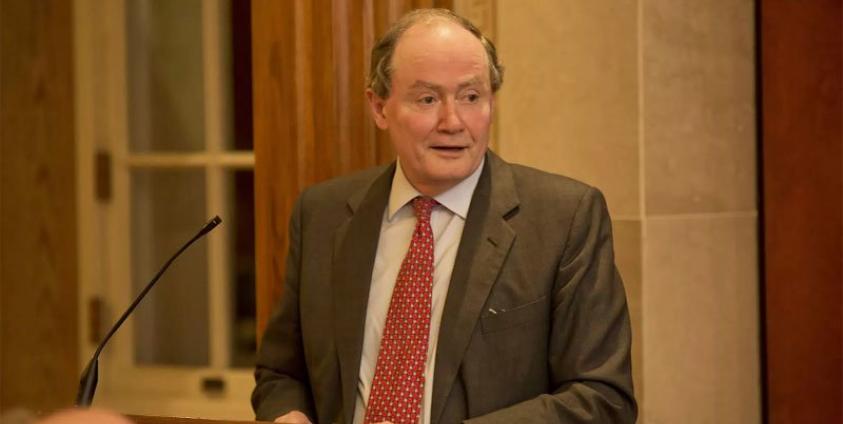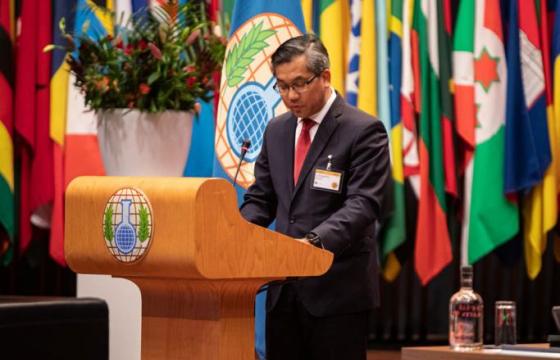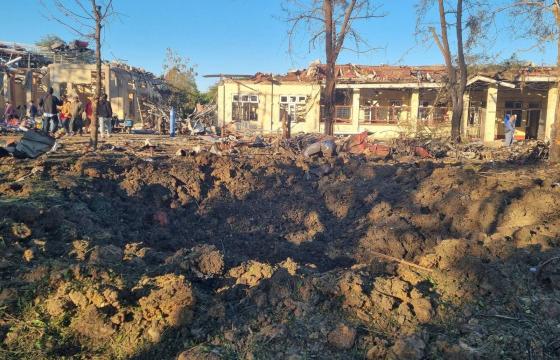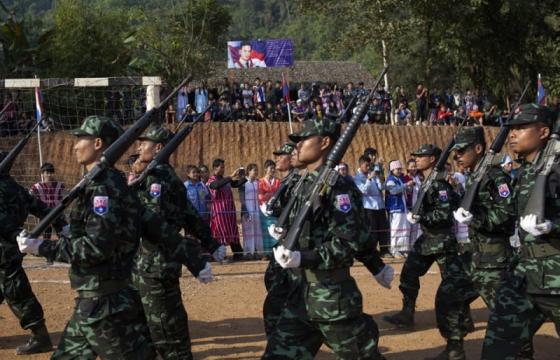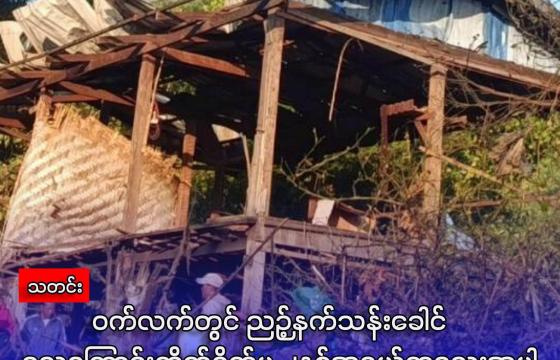A visiting UK High Court judge has spoken to Myanmar state officials about a judge’s role in dealing with complaints against the media.
Sir Michael Tugendhat (Ret.d) was a Judge of the High Court of England and Wales from 2003 to June 2014. He was the High Court’s most senior media judge from 2010 onwards. His books include: The Law of Privacy and Media; Liberty Intact: Human Rights in English Law; Fighting for Freedom?
Sir Michael Tugendhat was in Myanmar last week at the invitation of Free Expression Myanmar (FEM), Deutsche Welle and the Myanmar Press Council, to speak to state officials about a judge’s role in complaints against the media.
He took time out to answer questions from Mizzima about freedom of expression in Myanmar.
Myanmar's laws concerning freedom of expression and libel are proving restrictive. What should the Myanmar government do to provide a freer environment for the media to do its job?
There appear to be two reasons why Myanmar’s laws on freedom of expression are proving restrictive. One reason is that Article 499 of the Penal Code (1861) is still in force. According to this, and other legislation, defamation is a criminal offence, rather than a civil wrong.
The other reason is that judges appear to be interpreting the Penal Code, and more recent legislation such as the Telecommunications Law (2013) Article 66, without paying proper regard to the principle of freedom of expression, or the ordinary principles requiring that any law affecting the liberty of the subject must be restrictively interpreted.
This principle, and the principle of freedom of expression were a part of the law of Myanmar in 1861. They are, today, principles of international human rights law, as evidenced, for example, in the Universal Declaration of Human Rights (1948) Article 19.
International standards on freedom of expression now reject the punishment of defamation under the criminal law. Defamation should be under the civil law. Under the civil law the court may decide whether words complained of are defamatory, and, if so, whether there is a legal justification or exception, by which publication is nevertheless lawful. Exceptions make provision for the public interest, for example the public interest in criticism of those in authority.
In my experience, if, and when, a court has decided that words are defamatory, and have been published without justification, the person who has published them rarely threatens to repeat them. But if they do, that may be a contempt of court, for which it is accepted that the court may impose a penalty. A fine is the proportionate penalty in such cases. It is wholly exceptional for imprisonment ever to be an acceptable penalty for publishing defamatory words.
What role should Myanmar's Press Council play? There have been a number of cases brought to court, not least under section 66(d), that could ideally have been handled through the Press Council. Could a mechanism be set up whereby cases involving alleged libel could go initially through the Press Council?
My comments are made as a British lawyer, with knowledge of international human rights law. I cannot comment upon any possible role that the Myanmar Press Council might play.
It would, of course, be desirable for legislation to provide that cases of alleged defamation should not go through the criminal courts. But it is unlikely to be desirable to confer statutory jurisdiction upon a press council. As normally understood in Europe, a press council is a form of voluntary self-regulation by the publishers of newspapers. There are also statutory forms of regulation, which are commonly imposed on those who broadcast through radio or TV. But such statutes commonly impose upon the broadcasters obligations which restrict their freedom of expression, and which are not imposed on the print media, or upon members of the public. For example, they commonly impose obligations to maintain impartiality, decency and accuracy, which do not apply at all to the public at large, nor, in the case of impartiality, to the print media.
So long as a journalist or other publisher is at risk of criminal proceedings, any mediated solution reached through a regulator (whether that is statutory or a voluntary body) is likely to be disproportionately favourable to the complainant.
Is there a particular country that springs to mind that Myanmar could model when it comes to dealing with complaints against the media? Is the UK a country to model - or are their libel laws particularly strict?
UK law on defamation, contempt of court, official secrets, reporting of court proceedings, and other laws affecting freedom of expression, have developed substantially since Myanmar’s Penal Code was adopted in 1861, and in particular since the 1970s. So too have the laws of most European and common law countries. This has been achieved not only by legislative measures, but also by judges adopting interpretations of legislation which give greater emphasis to all forms of freedom, including freedom of expression.
UK law is less restrictive than some other European and Commonwealth laws. For example, it imposes a maximum limit on defamation damages, which results in awards that are lower than awards of damages available in some other common law jurisdictions.
One of the main influences on this development of UK law has been international human rights law, as interpreted through the European Convention on Human Rights. There are, so far as I am aware, no outstanding criticisms of UK law on the basis that it fails to comply with the European Convention, or any other international human rights standard.
The legislature and the judges of Myanmar each have a similar opportunity to actively and publicly strive to comply with international human rights standards.
From your discussions in Myanmar, how open are the authorities to relaxing restrictions on media freedom?
It has been a privilege to take part in discussions with many of those with responsibilities for the law relating to freedom of expression. I cannot comment upon their views.
Despite the National League for Democracy coming to power on the promise of democratic change, their track record is disappointing when it comes to freedom of the press and any willingness to substantially change the laws - as seen with a number of cases involving 66(d) and the recent case concerning two Reuters journalists charged under the Official Secrets Act, a hangover from British Colonial times. How do you view the challenges the government faces? Why the unwillingness to take media freedom seriously?
From the point of view of a British lawyer, the interpretation by Myanmar courts of what constitutes defamation under Article 66(d) is surprising. I would expect that the “defamation” referred to in Article 66(d) would be given the same meaning as in Article 499 of the Penal Code, including all the Exceptions set out in Article 499.
When Myanmar’s Penal Code was interpreted in courts a century ago, the Exceptions in Article 499 providing for publication in the public interest were given a very wide meaning in favour of liberty. This was in order to conform to the two principles referred to above, freedom of expression, and the need to interpret criminal laws to favour the liberty of the subject. For example, in 1914, in a defamation case where the plaintiff was a judge, the Privy Council held that, under Article 499 of Myanmar’s Penal Code, strong criticism of those holding public office is for the public good, even if the criticism is factually incorrect, provided that the critic has taken reasonable care. The Privy Council said:
“It is not defamation to make an imputation on the character of another provided that the imputation be made in good faith ... for the public good.”
“[It is a] false and dangerous doctrine … that some privilege or protection attaches to the public acts of a judge which exempts him, in regards to these, from free and adverse comment. He is not above criticism, his conduct and utterances may demand it. Freedom would be seriously impaired if the judicial tribunals were outside of the range of such comment.”
It is unclear why a century later, Myanmar judges give a restrictive meaning to Exceptions in Article 499 - which in effect undermines freedom of expression and liberty.
As you know, the civilian government lacks control over key ministries that are run by the Military. How much does the question of press freedom and developing a viable mechanism of media complaint depend on the Military being on board?
I cannot comment upon the role of the Military in Myanmar, save to say that the Constitution (2008) and international law apply to all those who may have responsibilities for freedom of expression. Although the Constitution makes specific provision for freedom of expression under Article 354, as a judge, it is to the general provisions for liberty at the beginning of the Constitution that I would look first in order interpret both Article 354 and the general law. The Preamble, Article 6 and Article 19 elevate the importance of liberty, of which freedom of expression is just one form:
.Preamble: ‘We the National people, firmly resolve that we shall … stalwartly strive for furthering the eternal principles namely justice, liberty, equality and the perpetuation of peace…’
.Article 6: ‘The Union’s consistent objectives are … (d) flourishing a genuine, disciplined multi-party democratic system; (e) enhancing the eternal principles of Justice, Liberty and Equality …’
.Article 19: ‘The following are prescribed judicial principles: (a) to administer justice independently according to law …’
Myanmar’s independent judiciary has a special constitutional duty to protect the rights of the public to liberty, including freedom of expression, if the executive or the legislature do not fulfil their own constitutional duty to protect their rights.

